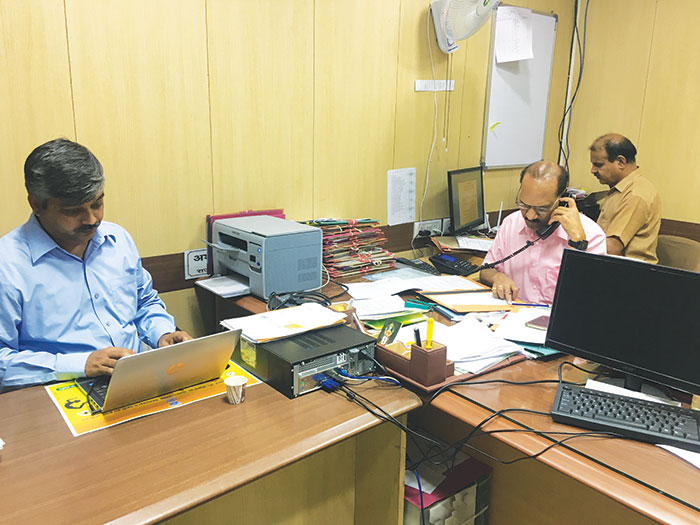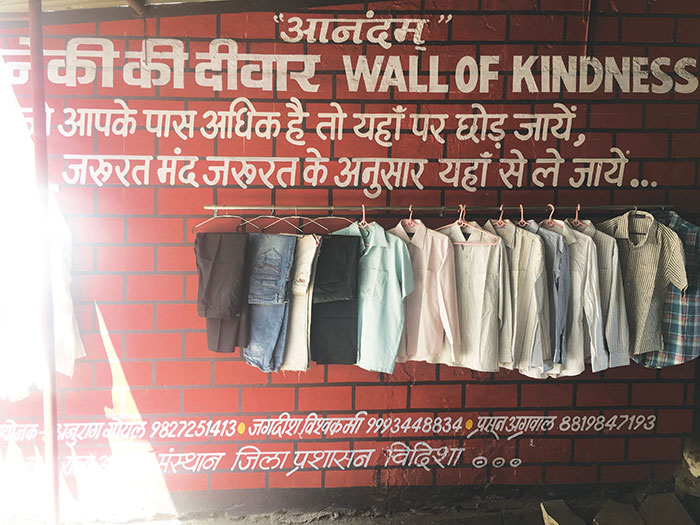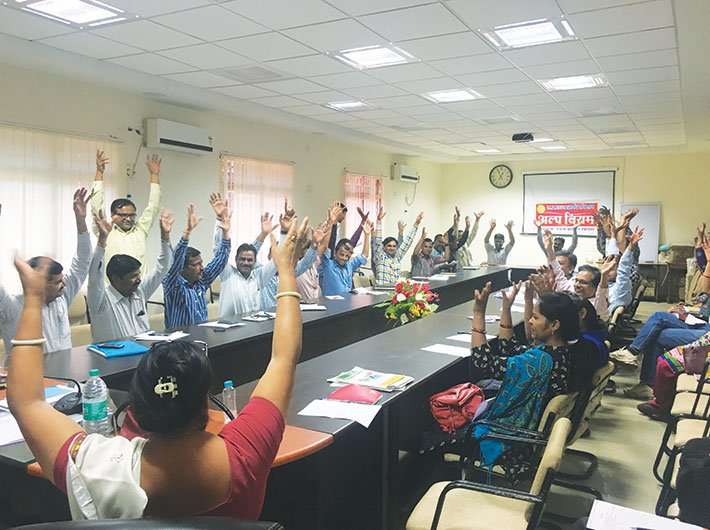Madhya Pradesh created the first government department of anand (happiness) in the country and its job is to promote feel-good sentiments in government offices and among people. What exactly does it do?
How to put a finger on that elusive thing called happiness? Well, for a beginning, you could set up a department, as the Madhya Pradesh government has done, the first (and only one) of its kind in India. No matter if the creation involves some bureaucratese: on August 6, 2016, a “happiness department” made its appearance through an amendment in the Madhya Pradesh Government Business (Allocation) Rules, under Heading No LXVII, rule 2. If Bhutan goes for Gross National Happiness (GNH), then the Madhya Pradesh government has its own Anand Vibhag, headed by none other than chief minister Shivraj Singh Chouhan.
READ: A happy tale of a tail
The department functions from Paryavas Bhavan, set in the heart of Bhopal and the hub of government bustle. It works from a small room on the first floor, right next to the mining department. Perhaps, the quest for happiness amounts to some earth-sifting! In its 2016-17 report, the Anand Vibhag, as the department is called in Hindi, made this sublime assertion: “For a complete life, it is important to have inner as well as outer well-being.” With that, it seems, the Madhya Pradesh government is now ready to take on the worries of its citizens and turn them into happy humans.
***
“The department doesn’t have a proper office, therefore we are not able to project ourselves in a proper way,” says Ashok Janwade, a consultant to the department. “We haven’t been allotted one, but we will be getting it soon. Once we shift to our new office, then full-fledged work will begin.” For now, it functions from a room with three desks, a long sofa, and some chairs.

A major undertaking of the department is to conduct Anand Utsavs, usually held in January, after the harvest, and when we visited the department, Janwade was busy collecting responses and reactions to the village festival over the phone from various district nodal officers. “The utsav began after the harvest season and continued for three weeks. It was a rural, mass-based festival in which the villagers participated in various sports activities.” He claims the programme has been very successful and also saw the participation of many women and elders from the villages. It largely involved villagers participating in sporting events, and clusters of three panchayats would join up for holding the event together.
READ: Matthieu Ricard, ‘the happiest man in the world’ on happiness
Matthieu Ricard, ‘the happiest man in the world’ on happiness - See more at: http://www.governancenow.com/views/interview/governments-can-provide-proper-conditions-that-facilitate-individual-wellbeing#sthash.sHNLCgsC.dpuf
These events are organised by the Anand Vibhag’s team of 10 members, which includes three directors, two consultants, one chief officer, one additional chief secretary, one research officer and two other officers. While most members have additional charge, with other responsibilities, they have voluntarily chosen to serve the department. There are nodal officers at district level who run programmes in each district. Again, they are government officials who have taken up work for the Anand Vibhag as an additional charge.
But the nitty-gritty is handled by about 32,000 volunteers, who go by the designation anandak, or provider of happiness. Unlike those at the top, these aren’t government employees. Says Satya Prakash, a consultant to the department, “It’s very simple becoming an anandak. It requires filling a form online to provide basic information, and stating that we want to join the programme. There’s no transaction of money, no funding, no honorarium. It is run by the efforts of volunteers.”
READ: Prof Peter Ronald deSouza on why the idea of having a department of happiness is completely bogus
The department is able to run on a budget of no more than Rs 2 crore (figure from its first annual budget). “There’s no funding needed because the schemes are developed in such a manner that does not need funding,” says Satya Prakash. “Some money is needed for orientation of the volunteers. The major cost incurred is for the training and travel cost of the volunteers.”
***
It’s a hot afternoon in the historic town of Vidisha, and the patidars of villages around this town are in a meeting with sub-divisional magistrate Ram Prakash in an air-conditioned room. The subject: allocation of land for a playing field in each village, a new scheme of the Chouhan government. First, the patidars announce how much land they have and where they can allot land for the playing field. The patidars and their villages are announced by the SDM, and the whole meeting takes almost an hour. In between, the SDM orders a break and announces that they could all watch a short film. As district nodal officer of the happiness department (a position he’s voluntarily taken on), this is part of his job.

The lights are switched off, and a movie about the life of an eagle plays out. It is in English, though the patidars are hardcore Hindi speakers, and is about how eagles supposedly rejuvenate themselves for a long life by retreating to a cave and plucking out their old feathers and talons and breaking their beaks so that they get a fresh set of feathers, talons and beaks. (Well, this is a myth, though all birds molt to shed feathers and grow new ones.) But the message is hokey in every sense, and there aren’t many sceptics around, so it seems to strike a chord. This little session is what they call alpa viram, a little rest. “During working hours for government staff, we try to take a break of an hour or half an hour or even a shorter span to give pause. In this pause, the government staff are made to introspect and think how to make themselves better,” says the SDM.
Such sessions are weekly affairs at most government departments, and are coordinated by volunteers called anandam sahyogi. Satya Prakash says, “The purpose of such alpa viram sessions is to listen to the inner self. This is not anywhere associated with work. There is no lesson for working on time or coming to office on time. There is no advice given. We only ask how can they become better human beings who can understand their shortcomings. The major focus is that a person should understand himself more, and understand where their happiness lies and work to get that happiness.”
These sessions seem like something between a moral science class and a motivation lecture and, if the questionnaires the participants have to fill out after the session is over are anything to go by, the participants score above average on how happy they are. It’s as if the department is taking good care – at least of the government servants.
***
Another initiative of the department is at work in the old market area of Vidisha. On a maroon coloured wall in a lane is a painted area. On the top left is written ‘Nekki ki deewar’ and on the right, the translation, ‘Wall of Kindness’. Shirts, trousers, etc. hang on a string as if for sale. But a message below explains the purpose: “If you have something extra that others might use, leave it here so that others may use it.” The clothes are donations left by people. This charity initiative is in line with what many NGOs do.
Says Satya Prakash, “There’s an OLX ad called the six-month break-up challenge. If one hasn’t used something for six months or more, it’s quite likely one won’t be using it. It might well be donated to someone for use.” OLX is of course a website for selling second-hand stuff; the department, on the other hand, looks to people donating stuff for the needy.
Says Suresh Yadav, “There is no monitoring and we don’t keep a register; there is no paperwork for it – no identity card, no name to be given. This is done so that the person taking the material should not feel he’s taking something from someone. This is a way in which the citizen can get over the burden of too much stuff and get mukta [free] of their materialistic being.”
Another scheme run by the department is anand sabhas. It’s for teenagers and they are taught life skills, including differentiating between what’s good and bad. These sessions are carried out in school, again, once a week.
***
“The philosophy of Anand Vibhag is about finding the anand that is within oneself,” says Manohar Dubey, an IAS officer who is the CEO of the department. “It’s not something that can be generated artificially. We are trying to ensure that the people of Madhya Pradesh recognise that inner happiness. We have developed some activities, we try to get people to follow them. Once they do that, they will feel happy about it.”
When the department was set up, it was with eight objectives, says Dubey. The chief objectives were: finding the parameters to define happiness and to coordinate between government departments to bring about general happiness in the public. Another objective, he says, was to look at and revise the data on happiness. “We are planning to make an index for happiness for the state. Currently, we have associated with various institutes and are planning to send a team to Bhutan. The work of creating the index is in progress and in three or four months we will create our index,” he says.
The department also wants a de novo approach to defining and measuring happiness: it does not want to go by current indices such as gross national happiness (GNH), used for ranking nations. “An idea based on a western concept cannot be applied in the case of India,” he says. “When you see this happiness index, even Bhutan is ranked 97 (in the 2017 report). How is it possible! Therefore, we need to look into our concept of happiness rather than borrowing it from the west.”
That is an interesting take, but the concept of happiness, as prescribed in the report of the UN’s Sustainable Development Solutions Network, includes concepts such as psychological well-being, health, time use, education, cultural and ecological diversity, resilience, good governance, community vitality, living standards and so on. Of course, it is responses from people (subjective as they are) that contribute to such rankings. Perhaps a new way of assessing happiness may be required in the Indian context. What the exercise should not turn into is a way of circumventing the hard questions about living standards, health, education and good governance that the UN index addresses, and instead focus on vague assessments of “inner happiness”.
feedback@governancenow.com
The article appears in May 31, 2017 issue

